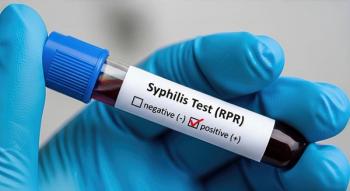In a recent report, the Centers for Disease Control and Prevention (CDC) provided recommendations for syphilis testing.
Takeaways
- The incidence of syphilis has risen significantly, with a 2140% increase observed from 2000 to 2020. This trend is marked by disparities in health, intersections with HIV and substance use, and higher morbidity and mortality rates.
- The CDC has provided recommendations for syphilis testing based on data from peer-reviewed journals and FDA-cleared diagnostic test inserts. These recommendations emphasize the consideration of individual, population, and community risk factors, as well as the importance of standardized terminology.
- Syphilis testing involves both nontreponemal (lipoidal antigen) tests and treponemal tests. Nontreponemal tests identify antigens specific to T. pallidum, while treponemal tests detect antibody responses to T. pallidum antigens. Interpretation of test results is crucial, considering factors such as treatment history, syphilis stage, and specimen quality.
- Benzathine penicillin G is recommended as the treatment for syphilis, provided the patient does not have an associated allergy. Following diagnosis, patients should receive appropriate treatment based on test results and clinical history.
- Future options for syphilis testing in the United States include point-of-care (POC) tests, which require further research to assess their performance in screening algorithms, special patient populations, cost-effectiveness, and linkage to treatment and care.
In 2021, approximately 176,000 cases of syphilis were reported to the CDC in the United States, with approximately 6 million reported worldwide. Treponema pallidum (T. pallidum), a pathogenic species that spreads during sexual contact, is the source of syphilis.
Symptoms of T. Pallidum begin with primary syphilis, presenting as ulcerative-like lesions. These may last for 2 to 6 weeks before healing, and 2 to 24 weeks after healing, secondary syphilis may appear.
Secondary syphilis is characterized by a rash on the trunk, palms, or soles, with approximately ¼ of patients experiencing mucous patches in the mouth or condylomata lata on the genitals or rectum. An increase in syphilis cases of 2140% has been observed from 2000 to 2020, characterized by health disparities, intersections with HIV and substance use, and increased morbidity and mortality.
The CDC created recommendations for identifying syphilis in patients using data from peer-reviewed journals. The data came from the Food and Drug Administration-cleared syphilis diagnostic test inserts, with literature review performed by the Association of Public Health Laboratories.
Serologic tests for syphilis were initially developed in the 20th century. The terminology of these tests, including nontreponemal tests, treponemal tests, and nonspecific antibodies, were standardized by the World Health Organization in 1954. According to the CDC, these terms should be updated over time to reflect new data about T. pallidum immunology.
Nontreponemal tests describe antigens specific to T. pallidum. Since a 2019 study of 526,540 reactive nontreponemal tests found 89% were associated with syphilis, indicating most of these tests identify antibodies triggered by T. pallidum phospholipid antigens, the CDC referred to them as nontreponemal (lipoidal antigen) tests.
In comparison, treponemal test are tests that identify antibody responses based on antigens specific to T. pallidum. Nonspecific antibodies are antibodies found during nontreponemal tests but are not specific to T. pallidum.
According to the CDC, individual, population, and community risk factors should be considered when diagnosing syphilis. Laboratory test results may differ based on treatment history and the current stage of syphilis. Following diagnosis, patients without an associated allergy should receive benzathine penicillin G for treatment.
Reactive antibodies indicate T. pallidum exposure, making detection important to determine syphilis infection. As no nucleic acid amplification test has received FDA-clearance, the CDC recommends nontreponemal (lipoidal antigen) tests be used during syphilis screening.
During nontreponemal (lipoidal antigen) testing, the same test method and specimen type should be used to evaluate patient specimens. These tests are often performed manually, but throughput can be achieved through automation in certain rapid plasma reagin tests.
Regardless of nontreponemal (lipoidal antigen) test type, the CDC recommends results be reported as an endpoint titer without greater or less than values. Factors impacting test performance include syphilis stage, specimen type and quality, autoimmune or other disease presence, and coinfections with other organisms.
To confirm the results of nontreponemal (lipoidal antigen) tests, treponemal tests are often utilized. High throughput screening allows these tests to be automated, and antibodies identified in treponemal tests often persist for life.
The CDC stated that patients with treated syphilis history and reactive treponemal test results should not receive further treponemal testing. Instead, syphilis in these patients should be determined based on nontreponemal (lipoidal antigen) test results, clinical history of syphilis, sexual risk assessment, and physical examination.
Additional treponemal testing is recommended for discordant nontreponemal (lipoidal antigen) and treponemal test results. Antibodies to T. pallidum should also be evaluated in blood donations.
Future options may be available for syphilis testing in the United States. This includes point-of-care (POC) tests, which require additional research on performance in screening algorithms, special patient populations, cost-benefits, and linkage to treatment and care. The CDC recommended studies compare POC tests with FDA-cleared laboratory-based treponemal serologic tests.
Reference
Papp JR, Park IU, Fakile Y, Pereira L, Pillay A, Bolan GA. CDC laboratory recommendations for syphilis testing, United States, 2024. Centers for Disease Control and Prevention. Accessed February 6, 2024.










